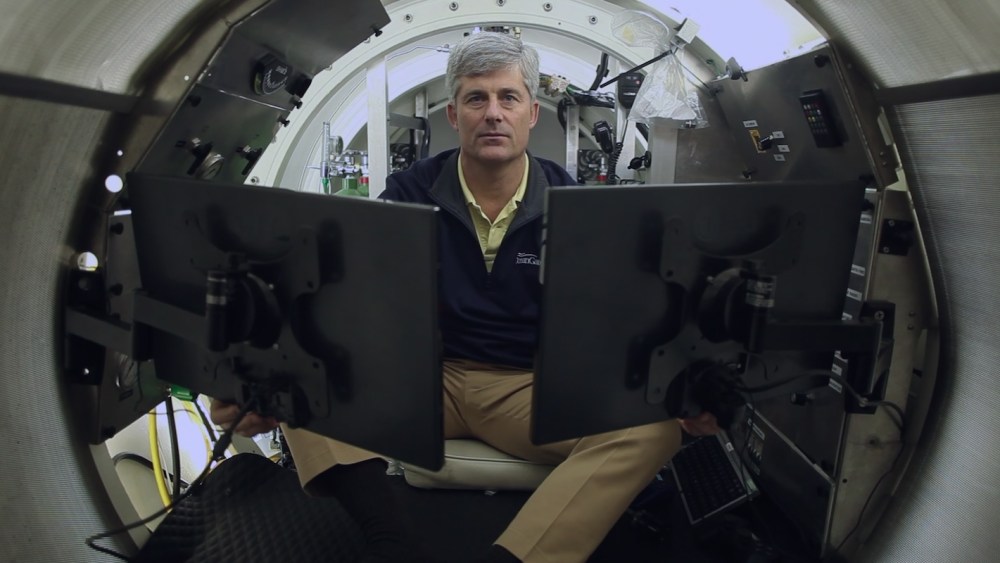In the Netflix documentary “Titan: The OceanGate Disaster,” director Mark Monroe examines the circumstances surrounding the fatal 2023 submersible disaster.
The vessel’s implosion, which occurred on the submersible’s sixth descent to the Titanic wreckage in the North Atlantic, killed five people, including billionaire and OceanGate’s co-founder and CEO Stockton Rush.
The doc, produced by Story Syndicate and Diamond Docs, explores Rush’s background and “his quest to become the next billionaire innovator.” In the film, former OceanGate bookkeeper Bonnie Carl says that Rush “wanted to be a Jeff Bezos or an Elon Musk. … He referred to those guys as big swinging dicks, and he loved that term.”
Interviews with Carl and fellow former OceanGate employees and whistleblowers, along with eerie audio recordings and footage from the company’s early days, explain how the OceanGate expedition ended in tragedy.
Rush’s idea was to reduce the doomed vessel’s weight and cost by using carbon fiber for the hull structure instead of the heavy titanium. The problem was that composite material had never been utilized for the purposes he intended, and the carbon fibers eventually began to snap long before the submersible imploded in 2023. Colleagues and experts alike warned Rush that the vessel was unsafe, but as the doc makes clear, he didn’t listen. Rush also refused to have it examined by a third party for safety classification.
Variety film critic Dennis Harvey compared “Titan: The OceanGate Disaster” to Werner Herzog’s “Grizzly Man” – “in that this is also a portrait of death by ego-driven hubris in which one victim shoulders all the posthumous blame.”
Story Syndicate’s head of documentary and nonfiction, Jon Bardin, said that while the OceanGate disaster was initially intriguing, the production company did extensive research before getting behind the project.
“With any story like this, we ask the question, ‘Is there a deeper story to tell? Is there more to this than the headlines, social media reaction, and just the horror of what took place that day?’ That’s the sort of research and digging that we did from the beginning, and we found out that the answer to our question was yes.”
“Titan: The OceanGate Disaster” made its world premiere at Tribeca Fest on June 6.
Variety spoke to Monroe and Bardin ahead of the doc’s June 11 release on Netflix.
Jon, what did you find during your digging that convinced you that this story could be a doc?
Bardin: When we met David Lochridge (former OceanGate director of marine operations ) we understood that there was a story to tell because, as you see in the film, he was shouting from the rooftops internally and then externally that something was wrong. The way Stockton treated him and his wife after he said something was wrong was also compelling.
Mark, was there a larger story you were trying to tell with this doc?
Monroe: Yes. There is a culture of people who exist in our society who believe that the rules don’t apply to them. That actually, it is an advantage to, as they say, break stuff and move fast. In this story, we saw that again and again.
The behind-the-scenes footage of Rush creating OceanGate and the vessel was fascinating. How did you find the footage and get the rights to use it?
Monroe: Our producer, Lily Garrison, found the videographer who shot that footage. He was hired as a guy to document the fruition of Stockton’s dream from the start of the whole thing, which tells you the kind of ego that Stockton had. He wanted people to film him in the earliest days as he set off on this journey. We have to thank Stockton for that footage because he made deals in which the rights to the material stayed with the shooter.
Stockton’s wife, Wendy, who was very involved in OceanGate, and their children are not in the doc. Did you request interviews with them?
Monroe: We had a producer who had access to them and it became very clear very early on that there would be no talking.
In May, Warner Bros. Discovery released their OceanGate doc titled “Implosion: The Titanic Sub Disaster.” It’s not unusual that two or even three docs about a popular topic get made, but was the Discovery doc a cause for concern during production?
Monroe: It didn’t really affect me because of David Lochridge.
Bardin: That was a critical part of the early producing work – to build trust with folks like David and other characters in the film, so that they were willing to work exclusively with us. You won’t see David in these other films because we had an exclusive relationship with him, and that’s built on time and trust.
Monroe: I knew what I had, and I knew what they would not have. To me, that felt like a key asset, a key perspective. But look, with a big story like this, there is probably more to come.
Read the full article here








